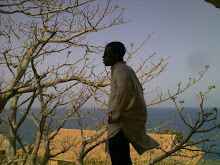Random thoughts here. Mainly on Nigeria. In fact, all about Nigeria.
Competitive advantage is what sustains a set of people in the global context. This preaches survival of the fittest. To survive, nations develop framework within which they can preserve their lifestyle, reduce unanticipated shocks and (in worse case scenarios) prevent extinction. Some focus on anti-globalisation. They try to ensure that their citizens consume what they produce. The socio-economic-political system is tailored along towards actualising this vision. Others look within to point out their strength and build on it. Is it possible for an economic to survive when crude oil is its most significant source of life?
I wonder what efforts can be made improve competitiveness of Nigerian manufactured goods in the global market. There is a company that has been making cornflakes since I was young. They still use the same ugly yellow carton wrapper and no innovative twist has been added to the content (it does not come in strawberry flavour, and no one has thought of making "cornflakes with a twist of Nigerian Apple"; yet the produce in Jos). A competitor they have (Kelloggs) has diversified into other business that guarantee the sustainability of their brand (cartoon character development, education and school projects). I also wonder why the local manufacturers of sachet milk & juice don't think it all through before implementation. Why do you need a knife to open the sachet when you have sachets with perforated holes on its body?
Infrastructures are terrible. I am tired of chatting about power so let me think of the roads, street lightings and street signs. The roads badly connect you to places and have no indicative signs. I spent a lot of time repairing my car (with particular focus on the shock absorbing/braking).
I think the "police is your enemy". When dealing with them, I am either bribing, doing a physiological stunt (make them assume I am related to President Yar'Adua) or shouting. The LASMA guys writing up their shopping list when you "pass one way" (the route for oncoming vehicles).
I wonder why our roads look like a theme park's crash car scene (with car driven by badly trained clumsy baboons). Traits of this environment:
- The life objective of most people seem to be achieved when they overtake the next car and are willing to do so at all cost and aggression level
- Some struggle to come first (in some race they created out of staying too long in traffic) results in crashes. No human identification system or effective legal framework so people therefore must sort the issue out either by effective negotiation or jungle justice
- Ever shrinking facilities to satisfy the cars bought by the nouveau-rich, spending off the every increase price of oil
- The roads made to move people, animals, okadas, hawkers, broken down vehicles and vehicles in whatever direction they deem fit
- Transactions are always going on; purchasing, bribing the police, beggars and just people who assume they add value by nothing
Our existence appears to lack substance. Money is spent heavily on purchase on perishable items. Art & culture is just a ministry. Does not do anything to add value to our orientation, life expectation, ethics and codes for living.
We have problems accounting for the number of people in this country. Population of people in Lagos ranges from between 9 to 17 million (a venture that cost us millions to find out). How do we know how many people have AIDS?
I think we have too much hope. Instead of doing what is required to improve our environment, we spend a lot of time hoping that someone will do it. This create rooms for not so knowledgeable pastors and Imams to teach us "the way" (instead of receiving medical treatments for their migraines) and earn a living of it.
Nigeria is traders paradise. All we do is buy anything (I mean anything, people make profit from selling sand). Our insatiable appetite is financed by the revenue from crude oil sold in the market. All business activities are sustained by this inflow.
I will get back to work. I could rant about this all day. As a full fledged member of the rat race, I do this chore not to add value but to afford the things I need to survive. Mainly purchases from abroad.
If I am not careful those that come after me will do the same or be some third class citizen in the ruling world economy; that will happen if the demand for oil drops. Otherwise he/she could even be a mercenary that will fight for the freedom of the Nigerian people; I hope our situation will not get to that.
Till then, the cycle continues.....

